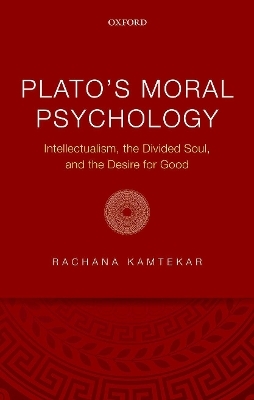
Plato's Moral Psychology
Intellectualism, the Divided Soul, and the Desire for Good
Seiten
2017
Oxford University Press (Verlag)
978-0-19-879844-6 (ISBN)
Oxford University Press (Verlag)
978-0-19-879844-6 (ISBN)
Rachana Kamtekar offers a new understanding of Plato's account of the soul and its impact on our living well or badly, virtuously or viciously. She argues that throughout the dialogues Plato maintains that human beings have a natural desire for our own good, and that actions and conditions contrary to this desire are involuntary.
Plato's Moral Psychology is concerned with Plato's account of the soul and its impact on our living well or badly, virtuously or viciously. The core of Plato's moral psychology is his account of human motivation, and Rachana Kamtekar argues that throughout the dialogues Plato maintains that human beings have a natural desire for our own good, and that actions and conditions contrary to this desire are involuntary (from which follows the 'Socratic paradox' that wrongdoing is involuntary).
Our natural desire for our own good may be manifested in different ways: by our pursuit of what we calculate is best, but also by our pursuit of pleasant or fine things - pursuits which Plato assigns to distinct parts of the soul. Kamtekar develops a very different interpretation of Plato's moral psychology from the mainstream interpretation, according to which Plato first proposes that human beings only do what we believe to be the best of the things we can do ('Socratic intellectualism') and then in the middle dialogues rejects this in favour of the view that the soul is divided into parts with some good-dependent and some good-independent motivations ('the divided soul').
Plato's Moral Psychology is concerned with Plato's account of the soul and its impact on our living well or badly, virtuously or viciously. The core of Plato's moral psychology is his account of human motivation, and Rachana Kamtekar argues that throughout the dialogues Plato maintains that human beings have a natural desire for our own good, and that actions and conditions contrary to this desire are involuntary (from which follows the 'Socratic paradox' that wrongdoing is involuntary).
Our natural desire for our own good may be manifested in different ways: by our pursuit of what we calculate is best, but also by our pursuit of pleasant or fine things - pursuits which Plato assigns to distinct parts of the soul. Kamtekar develops a very different interpretation of Plato's moral psychology from the mainstream interpretation, according to which Plato first proposes that human beings only do what we believe to be the best of the things we can do ('Socratic intellectualism') and then in the middle dialogues rejects this in favour of the view that the soul is divided into parts with some good-dependent and some good-independent motivations ('the divided soul').
Rachana Kamtekar has published many articles about ancient Greek and Roman moral psychology, and related areas, such as ancient moral and political philosophy and contemporary moral psychology, since her PhD (University of Chicago) in 1995.
Introduction
1: Doctrine and Dialectic in Plato's Dialogues
2: Psychology for Sophists
3: Why is wrongdoing unwilling?
4: The Divided Soul
5: Why is the Divided Soul Tripartite?
6: Psychological Eudaemonism and Explanation
| Erscheinungsdatum | 18.02.2018 |
|---|---|
| Verlagsort | Oxford |
| Sprache | englisch |
| Maße | 148 x 218 mm |
| Gewicht | 444 g |
| Themenwelt | Geisteswissenschaften ► Philosophie ► Ethik |
| Geisteswissenschaften ► Philosophie ► Philosophie Altertum / Antike | |
| ISBN-10 | 0-19-879844-X / 019879844X |
| ISBN-13 | 978-0-19-879844-6 / 9780198798446 |
| Zustand | Neuware |
| Haben Sie eine Frage zum Produkt? |
Mehr entdecken
aus dem Bereich
aus dem Bereich
unsere kollektive Verantwortung
Buch | Hardcover (2023)
wbg Theiss in Wissenschaftliche Buchgesellschaft (WBG) (Verlag)
35,00 €


